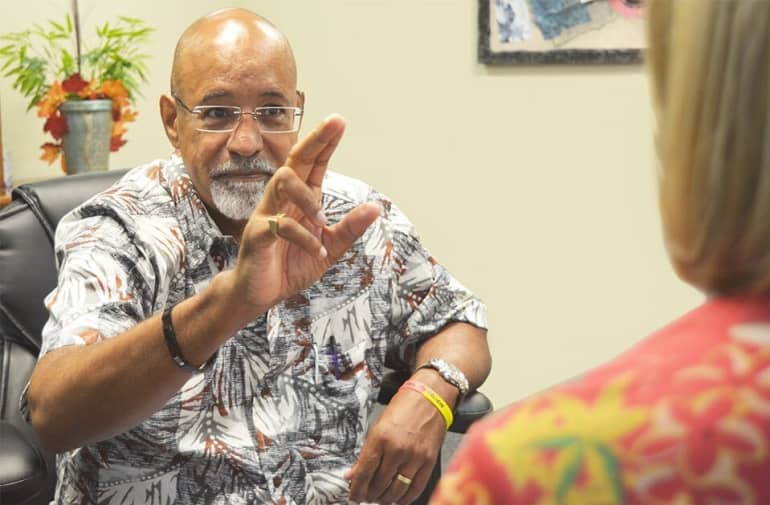Finding the right approach to address the needs of veterans can take time. Each veteran will have their own collection of techniques and approaches to cope with the challenges of daily life. From substance use and addiction that may have developed in the line of duty or at home as well as persistent anxieties, depression, and the continued effects of trauma and PTSD, exploring various proven treatment options to empower veterans to address these challenges is paramount. Eye movement desensitization and reprocessing (EMDR) is one of the options available through our treatment programs in Hawaii. Embracing EMDR for veterans can offer an effective approach to a transformed future in civilian life.
What Is EMDR?
To fully embrace the transformative potential of EMDR for veterans, it is important to understand what each EMDR session entails, as well as what to expect while engaged in the practice and its healing intentions. EMDR for veterans focuses on overcoming past traumas that may continue to impact daily life, or that may negatively affect a person’s ability to heal from emotional distress and past experiences. This form of psychotherapy focuses and draws attention to these traumatic events throughout healing, recontextualizing how these traumatic memories affect an individual and promoting strategies for navigating them.

During an EMDR session, veterans will be guided by trained professionals to focus on a particular memory that continues to have profound effects. For some veterans, such traumas can include flashbacks to life-threatening events experienced in the line of duty, while others may have their unique traumas to overcome, such as military sexual trauma (MST) from their experiences on base.
After identifying a particular trauma or challenge to be overcome, trained professionals at Hawaii Island Recovery will help veterans begin the healing process. Focusing on these memories and the negative feelings and beliefs that accompany them while using bilateral stimulation – usually through visual stimuli, auditory stimuli, or gentle taps – can allow veterans to replace any negative feelings with positive, self-affirming, and/or empowering thoughts.

EMDR is an effective, proven approach to treating trauma among veterans. Learn if it can help you by calling Hawaii Island Recovery today at (866) 390-5070.
More infoThe Goals of EMDR for Veterans
EMDR for veterans can have a myriad of positive effects, and can positively impact many different areas of daily life. Knowing how EMDR can benefit veterans can help deconstruct any unnecessary barriers and empower veterans to talk with professionals about how they may benefit from EMDR in their own recovery goals.
Resolve Past Traumas
Traumatic experiences can continue to inform civilian life for veterans discharged from active duty, with intense feelings of guilt, shame, fear, anxiety, and more all impacting their behaviors, coping skills, and even feelings of self-worth. EMDR can help veterans directly confront these past traumas and resolve them. While it can be impossible to change the past, an individual can always change how they feel about such events or how the event affects them. EMDR can empower veterans to relinquish some of these negative feelings and promote a healthier and more positive approach to daily life.
Address PTSD
Post-traumatic stress disorder (PTSD) is common among veterans, with 7% of veterans experiencing PTSD at some point in their life. However, this number may not reflect how many veterans still must overcome symptoms and traumatic experiences, as the wars and eras served, experiences on base, and much more can all inform the development of PTSD. Moreover, veterans who have been actively deployed can also be three times as likely to develop symptoms of PTSD.
EMDR for veterans can help to lessen these PTSD symptoms by helping to desensitize veterans to the effects of such experiences. By mitigating how intensely the symptom of PTSD can manifest, veterans can better employ further coping strategies and avoid self-destructive behaviors to promote a healthier and more controlled approach to daily life.
Improve Resilience
Resilience is a person’s ability to “bounce back” from stressful experiences and trials. EMDR for veterans can empower each person to not only process past challenges but also embrace new perspectives and practices that can improve resilience to overcome challenges that may lie ahead in recovery.

Eye Movement Desensitization and Reprocessing (EMDR) is a therapy developed in the late 1980s by California psychologist Francine Shapiro.
More infoCope With Self-Destructive Practices
Veterans may not only be tasked with overcoming the effects of PTSD but also a myriad of other challenges. From mental health disorders like anxiety and depression to substance use disorder (SUD), the needs of veterans will vary from person to person. For veterans, EMDR can allow them to explore new ways of viewing themselves and introduce empowering and positive self-image that can challenge other self-destructive practices.
Meanwhile, processing past traumas, anxieties, and other emotional challenges can mitigate the desire to self-medicate with addictive and dangerous substances. Along with a personalized plan that can be customized to address the needs of each veteran at Hawaii Island Recovery, addressing trauma, substance use, and other self-destructive beliefs and practices in tandem can create a truly transformative approach to a healthy civilian life.
While EMDR may not be effective for everyone, exploring its transformational potential can empower you or your veteran loved ones to make the most informed decision about how to pursue their own best and healthier future in civilian life. At Hawaii Island Recovery, we offer an array of proven strategies, from EMDR to effective spiritual practices, nature-based experiential therapies, and a plethora of proven other options to help you find the approach that best addresses your needs and goals in veteran life. Our treatment programs in Hawaii can be personalized to the needs of each individual, all backed by a community of peers and professionals that can support you each step of the way. Call us today at (866) 390-5070.
 Hawaii Island Recovery
Hawaii Island Recovery 










